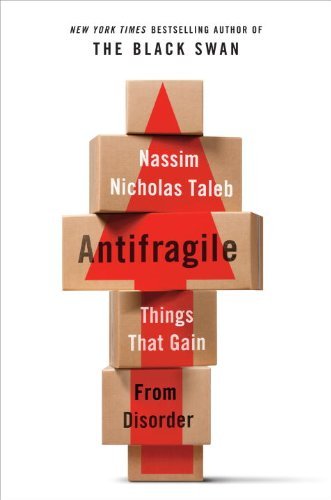Your name is Damocles. The king of the realm has forced you to sit at an elegant table in his castle and consume a sumptuous meal. The monarch has suspended a gleaming sword, tied to the ceiling by a single hair from a horse’s tail, over your head. At any moment the blade, like fate itself, can end your life. You are fragile.
Erase this Greek-Roman myth from your mind. Now your name is Phoenix. You are a bird of a magnificent colour. Each time that you are annihilated you re-emerge from your own ashes. Any person or force that destroys you simply enables you to re-incarnate back to your original state. You have no fear of the unknown. You are robust.
Let go of this Egyptian-Semitic-Greek tale and wander onto the set of another Greek fable. You are now a serpent with nine heads who lives in a lake near ancient Argos. Every time an assailant cuts off one of your heads two sprout back to replace the lost one. You are not fragile, you do not fear the unforeseen, but instead desire it.
In his newest bestseller, Anti-Fragile: Things That Gain From Disorder, Nassim Nicholas Taleb utilizes these myths to illustrate three types of exposure to the unpredictable. The text builds on his previous The Black Swan: The Impact of the Highly Improbable, in which he emphasized the importance of the realm of the unanticipated. Our “efficient” markets and economies have augmented our exposure to the negative forms of the unanticipated, making us individually and collectively more vulnerable. In his new book, Taleb focuses on ways of making us less fragile, more resilient, and more “anti-fragile”. By this term he denotes a condition and perception in which a successful immune system, entrepreneur or society is not only skilled at taking advantage of volatility, but organized to do so.
One way of taking advantage of the unpredictable, Taleb argues, is to embrace the example of Switzerland. He remarks that it is the most secure country in the world because unlike most it benefits from calamities. While the 2008 financial crisis destabilized other states, Switzerland’s currency has steadily risen in value as investment seeking safe conditions pours into the country. The nation has served as a financial shelter for the wealthy escaping turbulent areas and as a refuge for revolutionary figures like Lenin as well as Russian aristocrats like Nabokov seeking political protection. Taleb contends that the secret to Switzerland’s success lies in its highly decentralized, bottom-up form of governance comprised of largely sovereign municipal cantons. These exist in contrast to large states or institutions that make decisions based on ideology and statistical analysis — for example Stalinist Russia or the U.S. financial system — that can devastate the lives of millions.
Switzerland’s small-scale participatory forms of governance can also adopt choices that are ideological but they are balanced by regular visual contact, personal relationships, and close proximity between rulers and ruled. While there may be passionate conflicts within regions they are partitioned and thus not contagious across them. He suggests that the country is organized in such a way that internal volatility is desirable because it is contained while offering small-scale improvements that other regions can tinker with or emulate without causing the entire system to collapse. Switzerland’s intrinsic long-term continuity makes it an attractive country for investment in an era that is perpetually riven by economic instability.
Taleb’s fascinating as well as amusing insights come from his radical conservatism. He remarks, for example, that he only drinks coffee, wine and water because they are beverages that have been in existence for more than a thousand years. While the book is filled with criticism of bankers, economists and corporations, this does not translate into sympathy for progressives. He is equally critical of liberals like the economist Joseph Stiglitz and radicals like Jean-Paul Sartre. The depth of his commitment to tradition — and its uncomfortable implicit overlap with social Darwinism — enables him to recognize the value of an ecological approach. Taleb regularly looks to nature for guidance because he believes that evolution is the most anti-fragile of all systems; that is, volatility causes it to develop, not collapse.
The book deserves to be read widely and should be commended for its honest criticism of the core ethical defect of contemporary institutions. Taleb is persuasive in his view that our global system does not proceed according to stereotypical capitalist incentives or disincentives. Unlike the Romans who forced engineers to sleep under bridges they had built and unlike noblemen whose sons fought in the wars their fathers started, today’s elite decision-makers do not face the consequences of their choices. In our world the powerful are perpetually king while the vast majority are neither Phoenix nor Hydra.
Thomas Ponniah is an Affiliate of the David Rockefeller Center for Latin America Studies and an Associate of the Department of African and African-American Studies at Harvard University.




